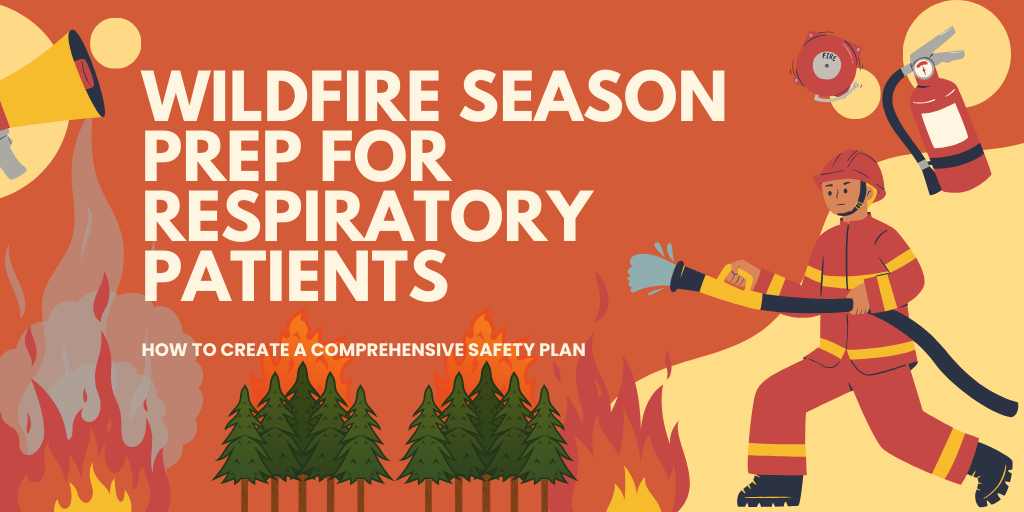
You might think that your gut and lungs are completely separate.
After all, one helps you breathe, and the other helps you digest food so it's not surprising that gut health is often overlooked, especially for the management of your respiratory disease like COPD.
But new research shows that they’re actually connected in a big way!
I'm not sure if you've noticed over the last few years, the importance of gut health has been highlighted and talked about more and more and not just in regards to respiratory disease management.
This connection is called the gut-lung axis, and it means that problems in your gut can impact your breathing.
What a unique interaction, as I'm sure you've never thought about your gut & lungs having a connection!
In this article, we’ll explain how your gut and lungs are linked, why gut health matters for your breathing, and what you can do to support both. Let’s dive in!
How Are Your Gut and Lungs Connected?
Your body works like a team, and different parts often "talk" to each other through the immune system.
Your gut is full of bacteria and other microbes (tiny living things) that help keep you healthy. This group of microbes is called the gut microbiome.
When your gut is healthy, it has a good balance of these helpful bacteria.
They produce signals that keep your immune system calm.
But if your gut is unhealthy, it can create inflammation (swelling and irritation) that travels through the body, even reaching the lungs.
This is why it’s called the gut-lung axis—because what happens in the gut can affect the lungs, and vice versa!
It's also important to point out, that having poor gut health can also lead to further issues related to digestion, mood and overall health.
So if you've never given a second thought to ensuring your gut is healthy, now is the time to start taking this seriously especially with a respiratory disease.
How Problems in Your Gut Can Affect Your Breathing
When your gut bacteria are out of balance, it can trigger an immune response that causes inflammation in your lungs.
Which if you didn't know, can make it harder to breathe, and for some of you reading this right now, it might even lead to conditions like asthma or worsen your COPD symptoms.
Here’s how these gut problems impact your breathing:
- Leaky Gut: Sometimes, tiny gaps open in the walls of the intestines, allow things like undigested food particles and bad bacteria to escape into your bloodstream. This results in inflammation, which can travel to your lungs and make it harder for you to breathe.
- Dysbiosis: This is when there’s an imbalance in gut bacteria—too many bad bacteria and not enough good ones. Or Changes in the metabolic activities of bacteria, or a shift in the distribution of bacteria in your gut. Dysbiosis can increase inflammation, which may lead to more breathing issues.
Signs To Watch Out For That Your Gut Might Be Affecting Your Lungs
Now that you're aware of the gut and lung connection, your next thought will be "how do I know if my gut health is making it harder for me to breathe?"
Here are some signs to look for:
- Digestive Problems: You might feel bloated, have frequent gas, or notice changes in your bowel movements (like constipation or diarrhea).
- Respiratory Symptoms: If you have more mucus than usual, experience wheezing, or feel short of breath and also have digestive issues, your gut health might be affecting your lungs.
- Fatigue and Brain Fog: Low energy and feeling “foggy” or unfocused can also be signs that your immune system is struggling, often because of gut issues.
If you’re experiencing some of these symptoms together, your gut health might be impacting your breathing.
How to Improve Your Gut Health to Help Your Lungs
Now that you know the link between your gut and lungs, here are some easy, actionable steps you can take to start putting in the work to improve your gut health and, in turn, help your lungs.
Please remain committed and consistent with these suggestions in order to see any potential benefits!
-
Eat More Fiber
Fiber feeds the good bacteria in your gut. So during your next grocery trip, keep an eye out for foods high in fiber that include vegetables, fruits, whole grains, nuts, and seeds.
Example: Try adding a handful of berries to your breakfast or a side of broccoli to dinner. At the beginning, try slowly incorporating these into your diet as you don't want to completely change everything at once which for some can cause them to give up and go back to what you've always been eating.
-
Eat Probiotics and Prebiotics
Probiotics are "good" bacteria, and prebiotics are fibers that feed them. Foods with probiotics include yogurt, kefir, and fermented vegetables like sauerkraut.
Furthermore, you can find prebiotics in foods like bananas, onions, garlic, and asparagus.
Example: Add a small serving of yogurt to your morning routine, or snack on an apple with a handful of almonds throughout your day while watching TV.
-
Stay Hydrated
Water helps keep things moving in your digestive system. Staying hydrated also helps keep mucus thin, and we all know keeping your mucus to a minimum makes it easier for you to breathe.
Example: Aim to drink 8 glasses of water a day. You can set reminders on your phone if you forget, or you could always get one of those water bottles that are labeled so you know as long as you finish that water bottle you have satisfied your water intake for the day!
-
Limit Sugary and Processed Foods
Sugary and processed foods can harm the gut microbiome by encouraging bad bacteria to grow.
Example: Swap sugary snacks for fruits like apples or berries, and if you are a soda drinker trying replacing that sugary fizzy drink with flavored water.
-
Consider Probiotic Supplements
If you can’t get enough probiotics from food, you might consider a supplement. Look for one with multiple strains of bacteria and at least 1 billion CFUs (colony-forming units).
Here's Some Additional Lifestyle Tips to Help Your Gut-Lung Connection
Taking care of your gut is a big step, but other habits can also support your lung health.
Here’s how:
-
Practice Deep Breathing
Deep breathing exercises help you get more oxygen and reduce stress, which benefits your gut.
Example: Try the “4-7-8” breathing method": breathe in through your nose for 4 counts, hold for 7 counts, and exhale through your mouth for 8 counts. Do this 3-4 times when you first start using this breathing method. But once you get some practice with it and get used to it, you can increase that number up to 8 cycles.
-
Manage Your Stress
Stress can affect the gut and cause inflammation. Try relaxing activities like walking, journaling, or listening to music. Stress is also a major impactor when you have a respiratory disease such as COPD, but chronic stress over a long period of time can lead to even further health complications, and if left untreated long enough even early death.
Example: Spend 10 minutes a day doing something calming, like reading or stretching. Try practicing gratitude and actually say out loud the things you are grateful for. It's a funny thing, even during stressful times, focusing on things you are grateful for is an incredibly effective way to calm yourself down!
-
Exercise Regularly
Exercise keeps both your gut and lungs strong. Aim for about 30 minutes of light exercise, like walking, most days. Keep in mind, you should already be getting in some exercise at least 3-4 times per week for regular management for your COPD.
Example: Take a brisk walk after dinner, try gentle yoga, pilates or chair exercises are an outstanding way to get your daily exercise in without leaving your house.
-
Get Enough Sleep
Poor sleep can mess with the gut microbiome, affecting both digestion and breathing. Poor sleep won't just affect your gut and breathing, but poor sleep can result in declined mental cognition, reduced energy levels making it harder for you to complete your regular daily tasks to name a few.
Example: Try to get at least 7-8 hours of sleep each night. Go to bed at the same time each night for better sleep quality, and try to wake up at the same time each day. Getting on a sleep schedule will help you get high quality sleep each night.
Myths and Facts About Gut and Lung Health
Let’s clear up a few common misconceptions:
- Myth: “Gut health only affects digestion.”
- Fact: Gut health impacts much more, including breathing, immunity, and even mental health.
- Myth: “Breathing problems only come from the lungs.”
- Fact: While many breathing issues are lung-related, an unhealthy gut can make breathing more difficult due to inflammation.
Final Thoughts on Gut Health & Breathing
So are you convinced about the important of your gut health, especially when it comes to the management of your COPD?
Your gut and lungs are more connected than you might think. By taking steps to improve your gut health—like eating more fiber, staying hydrated, and managing stress—you’re also helping your lungs stay strong and healthy.
Give these tips a try, and see if they help you breathe easier. Taking care of your gut may be just what you need to support your breathing and overall well-being!
Drop a comment below and let us know if you started seeing an improvement after starting to improve the health of your gut!







